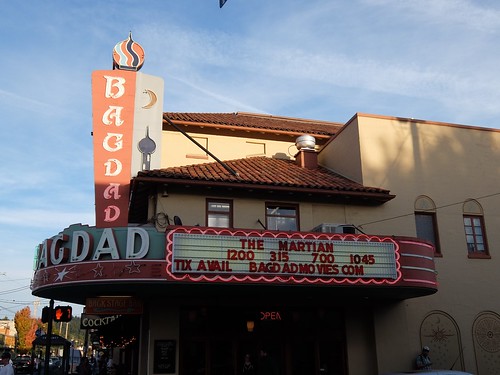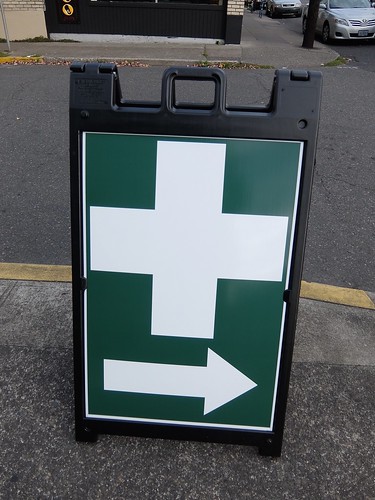Starbucks is an institution built around coffee, a brew of chemistries, and inheriting work already done, say in France, to make the "coffee shop" an alternative to the tavern, or speakeasy.
People go to bars and taverns to maybe get somewhat rowdy, to sing loudly in chorus even, and to cheer for their sports team on TV.
People go to coffee shops to read magazines in private, use the WiFi, and, stereotypically, engage in one-on-one conversations, about geopolitics, philosophy, trends in art.
However those are merely two ends of a spectrum. Some bars, such as Lucky Labrador, are quite friendly to laptops and nerding out over board games. Geek bars are not sports bars. Lucky Lab has no TV.
As a rule of thumb however, there's osmotic pressure to not take your laptop into a bar for solitary WiFi activities. For one thing, it's pretty easy to spill beer.
Coffee shops keep the WiFi tap open and flowing freely, hoping customers will continue to sip beverages and buy baked goods.
Given this background, it's not surprising that the coffee shop, not the pub or public house, has become more of a business buzz space, the place to do work.
Given the lighting and relative quiet, the coffee shop is a safe space for job applicants to meet potential employers, for contract negotiations, business oriented conversation (BOCs or "boxes"). Especially those who work at home need a neutral ground to make deals in. Even politicians hold court.
Bars and taverns were targeted by Puritans in the US, who tried to permanently ban them as an institution, by means of a US Constitutional Amendment (called Prohibition). Taverns were the devil's churches, congregation halls wherein sinners might practice their vices with impunity.
However "the boys" coming home after the World Wars would not be denied their grog, having put their lives on the line for their country. Some had sampled the best of Germany's craft brews, as well as England's and so on.
However the post WW2 invention of aluminum pull-top cans and TV dinners changed the equations: the exGIs could stay home to watch TV with their war bride sweeties, drinking the new factory-scale national brands, such as Bud and Miller Lite (craft beers would re-emerge big time in the 1990s, starting with Anchor Steam simply staying alive).
Thanks to the I-system (the freeway interstates) and the trucking so enabled, drinking beer at home, not just more expensive wines and spirits, became the new normal. Even though Prohibition had been lifted, the anti-tavern mentality had made lasting inroads.
Sex outside of licensed relationships (unlicensed sex) is what bars were perceived to foment and enable. Bars were the enemy of marriage (in the nuclear family sense) and tranquil nests, thanks both to loose women ("floozies") and dad coming home drunk, beating the wife and kids in some melodramatic show of patriarchal frustration.
As most of us know, unlicensed, oft paid-for sex, is typically de-legitimized as prostitution (a known vice), and run as an organized criminal business (by definition). In joining the military, a studly young man hoped to escape domestic Puritanical strictures by having "a good time" overseas, where, in some tropical paradise, sex without a marriage license was no crime at all.
Coffee shops were and are to this day seen as much less of a public threat to law and order. At worst, the latter were more likely to give rise to "beatniks" (later "hippies" then "hipsters") and political subversives (e.g. "commie symps"). Eggheads in general are more likely to question Puritanical authority and spread dangerous ideas regarding "open license" sex (known as "licentiousness" in the Puritanical vocabulary) and alternatives to marriage.
True to form, in being a geek and business oriented, I've been hanging out at the local Starbucks learning about ISO stuff i.e. ISO 9001:2015. One of the world's leading authorities on that topic hangs out there on occasion. I was introduced by Deke the Geek.
At home, I study the certification system, with its certifiers of registrars and so on. By means of ISO 9000 and so on, companies work to appear to one another, and/or to governments, as "squeaky clean" (the opposite of criminal, plus competent and sincere). Such cosmetics are important for organizations and may go a long way towards attracting the "right" clientele.
I got my own certificate of completion from such an auditing outfit, named the Distance Education and Training Council (DETC), when I read through their lengthy guidelines and took the reading recollection quizzes. I've usually been pretty good at those.
However certifying organizations is not the same thing as certifying individuals and my taking that course was but a small part of a larger organizational undertaking. My co-workers took it too. The boss told us we had to and we did, knowing the goal was increased long term viability for our school.
Coffee Shops are sometimes allowed to sell a few beers nowadays. In Asylum District, cannabis products are available for recreational purchase a few doors down from any coffee joint. Even if Starbucks is not directly selling THC-spiked edibles, there's nothing to stop their customers from consuming same, while continuing to uphold a business-like sense of decorum.
Time will tell how these new chemistries will sort out. Other states are watching. Chances are, as the culture continues to mature, the Asylum District will continue to produce new concepts in industry. The Silicon Forest already owes a lot to this neighborhood, a boyhood haunt of Linus Pauling, and later host to first offices of ESI and Tektronix.
People go to bars and taverns to maybe get somewhat rowdy, to sing loudly in chorus even, and to cheer for their sports team on TV.
People go to coffee shops to read magazines in private, use the WiFi, and, stereotypically, engage in one-on-one conversations, about geopolitics, philosophy, trends in art.
However those are merely two ends of a spectrum. Some bars, such as Lucky Labrador, are quite friendly to laptops and nerding out over board games. Geek bars are not sports bars. Lucky Lab has no TV.
As a rule of thumb however, there's osmotic pressure to not take your laptop into a bar for solitary WiFi activities. For one thing, it's pretty easy to spill beer.
Coffee shops keep the WiFi tap open and flowing freely, hoping customers will continue to sip beverages and buy baked goods.
Given this background, it's not surprising that the coffee shop, not the pub or public house, has become more of a business buzz space, the place to do work.
Given the lighting and relative quiet, the coffee shop is a safe space for job applicants to meet potential employers, for contract negotiations, business oriented conversation (BOCs or "boxes"). Especially those who work at home need a neutral ground to make deals in. Even politicians hold court.
Bars and taverns were targeted by Puritans in the US, who tried to permanently ban them as an institution, by means of a US Constitutional Amendment (called Prohibition). Taverns were the devil's churches, congregation halls wherein sinners might practice their vices with impunity.
However "the boys" coming home after the World Wars would not be denied their grog, having put their lives on the line for their country. Some had sampled the best of Germany's craft brews, as well as England's and so on.
However the post WW2 invention of aluminum pull-top cans and TV dinners changed the equations: the exGIs could stay home to watch TV with their war bride sweeties, drinking the new factory-scale national brands, such as Bud and Miller Lite (craft beers would re-emerge big time in the 1990s, starting with Anchor Steam simply staying alive).
Thanks to the I-system (the freeway interstates) and the trucking so enabled, drinking beer at home, not just more expensive wines and spirits, became the new normal. Even though Prohibition had been lifted, the anti-tavern mentality had made lasting inroads.
Sex outside of licensed relationships (unlicensed sex) is what bars were perceived to foment and enable. Bars were the enemy of marriage (in the nuclear family sense) and tranquil nests, thanks both to loose women ("floozies") and dad coming home drunk, beating the wife and kids in some melodramatic show of patriarchal frustration.
As most of us know, unlicensed, oft paid-for sex, is typically de-legitimized as prostitution (a known vice), and run as an organized criminal business (by definition). In joining the military, a studly young man hoped to escape domestic Puritanical strictures by having "a good time" overseas, where, in some tropical paradise, sex without a marriage license was no crime at all.
Coffee shops were and are to this day seen as much less of a public threat to law and order. At worst, the latter were more likely to give rise to "beatniks" (later "hippies" then "hipsters") and political subversives (e.g. "commie symps"). Eggheads in general are more likely to question Puritanical authority and spread dangerous ideas regarding "open license" sex (known as "licentiousness" in the Puritanical vocabulary) and alternatives to marriage.
True to form, in being a geek and business oriented, I've been hanging out at the local Starbucks learning about ISO stuff i.e. ISO 9001:2015. One of the world's leading authorities on that topic hangs out there on occasion. I was introduced by Deke the Geek.
At home, I study the certification system, with its certifiers of registrars and so on. By means of ISO 9000 and so on, companies work to appear to one another, and/or to governments, as "squeaky clean" (the opposite of criminal, plus competent and sincere). Such cosmetics are important for organizations and may go a long way towards attracting the "right" clientele.
I got my own certificate of completion from such an auditing outfit, named the Distance Education and Training Council (DETC), when I read through their lengthy guidelines and took the reading recollection quizzes. I've usually been pretty good at those.
However certifying organizations is not the same thing as certifying individuals and my taking that course was but a small part of a larger organizational undertaking. My co-workers took it too. The boss told us we had to and we did, knowing the goal was increased long term viability for our school.
Coffee Shops are sometimes allowed to sell a few beers nowadays. In Asylum District, cannabis products are available for recreational purchase a few doors down from any coffee joint. Even if Starbucks is not directly selling THC-spiked edibles, there's nothing to stop their customers from consuming same, while continuing to uphold a business-like sense of decorum.
Time will tell how these new chemistries will sort out. Other states are watching. Chances are, as the culture continues to mature, the Asylum District will continue to produce new concepts in industry. The Silicon Forest already owes a lot to this neighborhood, a boyhood haunt of Linus Pauling, and later host to first offices of ESI and Tektronix.


